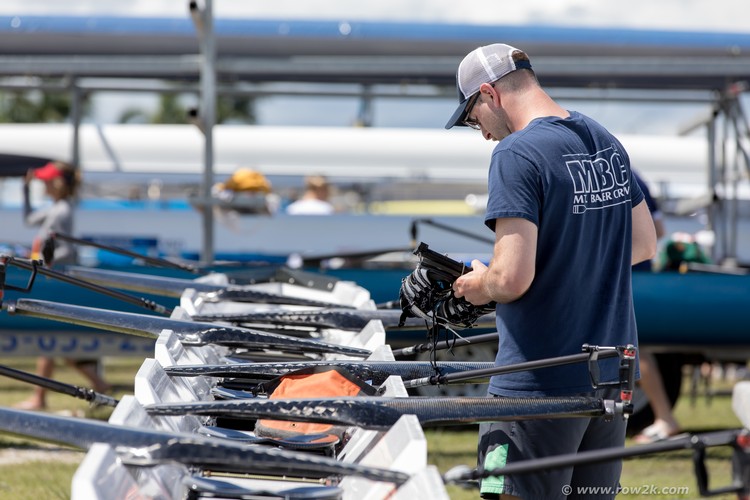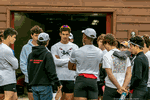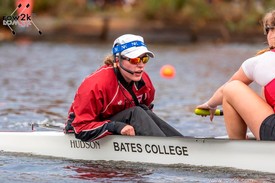Life of a Youth Rowing Coach Part 3: The Challenges

To learn more about this series and the topics we plan to cover, please visit the Youth Coaches Corner's index page. Youth coaches are more than welcome to contact row2k to get involved in future columns.
In this installment, the answers we received to the question we asked about the challenges one finds in the Life of a Youth Rowing Coach, as a counterpoint to the look we took at the rewards:
What is the most difficult part of coaching?
DAN ENGLER - BETHESDA-CHEVY CHASE HS - VARSITY MEN
It's hectic!!! Most of the coaches I know are holding down multiple jobs. Daily, I leave for school at 7am, teach from 7:30-2:30, and then coach rowing from 3:30-6:30pm to complete the 12 hour day. I maintain the motor boats for my team and most of the others at Thompson Boat Center as well, making for a full day. Unless we have a race, I really try not to practice on the weekends so I can stay married. As a head coach, I'm responsible for maintaining our equipment, keeping each squad safe, helping develop the staff, along with coaching the varsity boys. Our rowing team is not supported by the school, and so we have a governing board of parents. In partnership, the board and I decide how to best fund, maintain and foster the program.

JOHN THORNELL - STONINGTON CREW - DIRECTOR OF ROWING
Selection. It’s difficult telling someone who worked hard that they didn’t get a spot in a particular boat. I explain why they didn’t get a spot, but I also make it a point to highlight things that they are doing well and encourage them to continue working hard.
When rowers don’t achieve something specific, like a seat in the 1V8, they can feel like they have failed. Giving them a balanced perspective on their young rowing career helps them work through setbacks.
CONOR FEARON - BOSTON LATIN SCHOOL - VARSITY WOMEN
I would say the most difficult part of being a junior coach and program director is that the small problems never seem to relent. If something gets damaged, you or another coach are the ones repairing it. When the docks need to be moved for the winter or for different river events, it's on you/the team. You're driving the trailer to and from races. You're working with parents to get athletes to and from practice and races. You have board meetings that eat up what should be a free night. You have to make sure the gas cans are filled up. When something is stolen or there's a homeless person passed out on your dock you're the one calling the police department. You have to get new coaches, athletes, and parents up to speed about how the team works. All of this seems to pile up and it's very easy to feel swamped by all of the little details.
This is something I work every year to get better at, and I'm still pretty bad at it. I work at being more organized in general or being proactive about delegating so I don't accidentally take too much on. As one of the longest tenured people on the team and the program director you forget that everyone doesn't know everything that goes into running the team. It can be frustrating when they can't read your mind on what needs to be done, so communicating what is happening is crucial.

CHRIS RICKARD - JACKSON/REED HS - VARSITY WOMEN
The hardest part is balancing coaching with the rest of my life. Coaching can be all consuming if you let it. It's important to be invested and to work hard but that will also lead to burn out. So finding a way to work hard and be successful but also make time for all the other crucial parts of life is tricky.
BEN WILLIAMS - RIVER CITY ROWING CLUB - VARSITY WOMEN
Honestly, the most difficult part of my coaching job is that it's not my only job. I think I'm like a lot of other junior coaches at smaller clubs, in that we don't quite have the demand required to fully fund salaries for an entire staff of rowing coaches.
Rowing is a huge part of my identity, and honestly the coaching is where I put the bulk of my thoughts and effort, so there are some days where I find myself wishing I could be down at the boathouse fixing coxbox wiring or making rigging changes, but my full-time job is just that: "full time." I don't believe it is a barrier to success; if anything, it just makes me so much more grateful for the time I get to spend on the water.

ANONYMOUS COACH - NOVICE MEN
Most difficult part: making boatings. I coach at a prep school, where a spring sport is required, so I have these kids who have to be there. While they are trying hard, they simply don't make the grade. While it's a great low-risk learning experience for them, especially as these are often kids who have always excelled in school and other activities, it's still hard. The hardest choices are between kids #6-10 in the pecking order. The ones on the cusp. I imagine it's the same for other coaches. At that point you have to rely on experience to draw the line.
There's also what I would consider the most frustrating part: the kid who no matter how much you explain, demonstrate, etc., just doesn't get it. Some of those do still enjoy it enough to come back to the varsity next year, where they are perpetually near the bottom of the pecking order. In some ways, though, those kids also become my personal success stories: they don't excel at rowing, but I helped them learn to enjoy it enough that they keep coming back even though they are eternal spares.
RICH KESOR - MONTGOMERY BELL ACADEMY - VARSITY MEN
The most difficult part of being a head coach is balancing the logistics. With 60+ HS boys and 50+ 7th/8th grade boys and only six total coaches, it is a balancing act to make sure that we can get as many kids SAFELY on the water as possible while making sure that the HS boys are well-prepared to race. The addition of our sister school's team (35 HS, 56 7th/8th and 2 new coaches) has added new challenges. Luckily, we have acquired enough equipment to get a whole slew of kids on the water each day. We are also lucky to work with some very motivated and focused young adults. The fact that they show up every day ready to work hard makes our lives a lot easier.
My tips for balancing coaching with full-time teaching? First, have a very supportive spouse! Even going into my 30th year coaching, it is something with which I still struggle. It is difficult to juggle trying to do my best for the students in my classroom, the athletes on the team, and to be a good husband and father. But I have learned that if I don't model what a good balance is for the athletes, they will not have a good balance. I encourage them to get involved in activities other than rowing (theater, music, other sports, etc). In order to give them time for other activities, we practice only once per day (3:45-5:45pm) and the only weekends are during regattas.
I also design the training/drill program for the entire season before the first practice. By getting it done early, it saves me time during the season when teaching load is in full swing. I hear delegation works very well and it is something that I need to continue to get better at.

If you enjoy and rely on row2k, we need your help to be able to keep doing all this. Though row2k sometimes looks like a big, outside-funded operation, it mainly runs on enthusiasm and grit. Help us keep it coming, thank you! Learn more.
Comments | Log in to comment |
There are no Comments yet
| |
- Bont Rowing
- Calm Waters Rowing
- Concept 2
- Craftsbury Sculling
- The Crew Classic
- CrewLAB
- Croker
- Dad Vail Regatta
- Durham Boat Co.
- Empacher
- Faster Masters
- Filippi
- Fluidesign
- h2row.net
- HUDSON
- Live2Row Studios
- Nielsen-Kellerman
- Oak Ridge RA
- Peinert Boat Works
- Pocock Racing Shells
- Race1 USA
- Rockland Rowing Masters Regatta
- RowKraft
- Rubini Jewelers
- Vespoli USA
- WinTech Racing
- Bont Rowing
- Calm Waters Rowing
- Concept 2
- Craftsbury Sculling
- The Crew Classic
- CrewLAB
- Croker
- Dad Vail Regatta
- Durham Boat Co.
- Empacher
- Faster Masters
- Filippi
- Fluidesign
- h2row.net
- HUDSON
- Live2Row Studios
- Nielsen-Kellerman
- Oak Ridge RA
- Peinert Boat Works
- Pocock Racing Shells
- Race1 USA
- Rockland Rowing Masters Regatta
- RowKraft
- Rubini Jewelers
- Vespoli USA
- WinTech Racing

















